SYED KHALIQUE AHMED
NEW DELHI, AUG 2
When Prime Minister Narendra Modi announced on July 29 to implement 27% OBC and 10% EWS reservation in All India Quota (AIQ) for undergraduate and postgraduate medical courses in government medical colleges across the country from the current academic year (2021-22), it gave an impression that it was the Central government’s largesse.
Though many parties including the principal opposition party AIADMK claims credit, it was DMK which moved a contempt petition and got the order from Madras High Court.
But what was not revealed was the AIQ to be implemented on the directions of the Madras High Court.

The Madras High Court had given an order on July 27, 2020, to implement a 27% reservation for OBC in the AIQ for UG and PG medical courses in Tamil Nadu. The order was given on a petition filed by the DMK party. However, the Central government did not implement the order on the plea that a similar case filed by one Saloni Kumar seeking 27 % OBC reservation in the AIQ in medical and dental colleges in Uttar Pradesh was pending before the Supreme Court. But the Supreme Court clarified that the Saloni Kumari case has nothing to do with the Tamil Nadu case. Yet, the Centre delayed the implementation. DMK finally moved a contempt petition in the Madras High Court. Hearing the contempt petition on July 21, 2021, the high court bench comprising Chief Justice Sanjib Banerjee and Justice Senthilkumar Ramamoorthy stated that the Union government has no choice other than implementing the reservation. The bench directed the Centre to clarify the mode and manner of implementing the OBC quota within a week. The next hearing in the case was scheduled for July 26. The high court also observed that delaying the quota implementation appears to be “contumacious” or wilfully disobedience to authority.
Solicitor General Tushar Mehta on July 26 told the court that the Centre was preparing the implementation plans and sought one week’s time for its implementation.
PM subsequently announced the OBC and EWS reservation under the AIQ scheme for medical education. He announced that the AIQ scheme would benefit 1500 OBC students in MBBS and 2500 OBC students in post graduation and around 550 EWS students in MBBS around 1000 EWS students in post graduation.
Read Also:
But the timing of the announcement coinciding with the forthcoming UP assembly elections gives an impression that the quota implementation is politically motivated, though it is based on court orders.
The AIQ scheme was approved by the Supreme Court in 1986 to provide domicile-free merit-based opportunities to students from any state to seek admission in a good medical college in another state. The AIQ consists of 15% of total UG seats and 50% of total PG seats in government medical colleges.
Read Also:
Initially, there was no reservation in the AIQ scheme, and all the seats were under the open category. But the Supreme Court in 2007 allowed 15% for Scheduled Castes and 7.5% for Scheduled Tribes in the AIQ scheme.
When the Central Educational Institutions (Reservation in Admission) Act became effective in 2007, providing for uniform 27% reservation to OBCs, the AIQ scheme was implemented in all the Central Medical Educational Institutions, for example, Safdarjung Hospital, Lady Harding Medical College, Aligarh Muslim University and Banaras Hindu University, etc.
Read Also:
Puducherry speaker thanks PM, Centre for 27 pc reservation in AIQ for OBCs in medical education
However, this was not extended to the AIQ seats of the State medical and dental colleges. As the states vacated the seats for the central pool for better medical education opportunities all over the country, the DMK felt that it was discriminatory on the part of the Centre not to fix the OBC quota in the AIQ scheme and moved the Madras High Court. The high court ordered in favour of implementing the OBC quota in the AIQ scheme.
Though the Union government also implemented 10% reservation in the AIQ seats from candidates belonging to Economically Weaker Sections, this is the consequence of the orders of the Madras High Court, which the DMK approached with the demand.
(Syed Khalique Ahmed is the Chief Editor of indiatomorrow.net)












